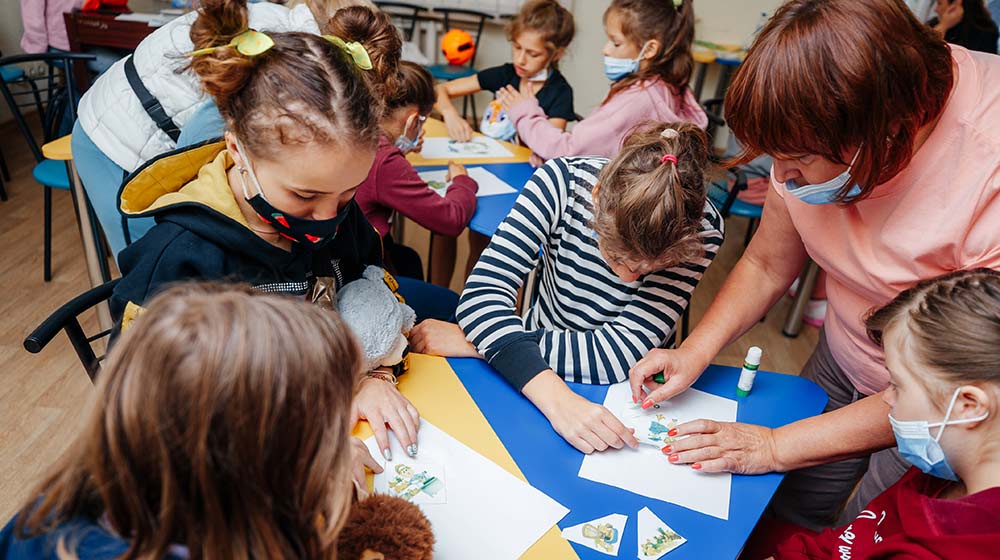News
Equal opportunities for girls with intellectual disabilities in Ukraine
- 09 December 2021
News
KYIV, Ukraine – “Everyone, do an exercise called butterfly. Who will fly faster? Wave your wings!” football coach Serhiy called out to a group of 12 adolescent girls.
The girls are participating in a football class that is part of the “Come on, Let’s Play” project for girls with intellectual disabilities. But the programme is not only intended to expose the girls to exercise, teamwork and recreation; it is also an opportunity to learn social skills and, crucially, to help the girls communicate openly about their needs.
The project is being implemented in Kyiv, as well as Mariypol, Vinnytsia and Kharkiv, through a partnership between UNFPA, the Shakhtar Social Foundation and the Special Olympics. Together there are about 80 girls attending the classes, representing a significantly underserved population, according to Andriy Pidvarko, a Special Olympics executive director in Ukraine.
“Official data shows that people with intellectual disabilities constitute 65 per cent of all other groups of disabilities. Despite being a majority, little to no attention is paid to them,” he said. “We want and need to change that.”
Globally, girls and young women with disabilities are extremely vulnerable to violations of their rights and bodily autonomy. They are more likely to experience violence than either their male peers with disabilities or women and girls without disabilities. Both boys and girls with disabilities are nearly three times more likely to endure sexual violence, with girls at the greatest risk, yet they often lack access to protection, justice and services. Many societies fail to equip persons with disabilities with even the information and communication skills necessary to allow persons with disabilities to address their vulnerabilities, needs, desires and experiences.
The challenges are significant. Not only do persons with disabilities face widespread stigma, bullying and vulnerability, they are also having many supportive services curbed because of the COVID-19 pandemic. As education and other programmes moved online, for example, children with intellectual disabilities were often left behind.
To address these concerns, “Come On, Let’s Play” has launched a life skills programme, piloted at the ‘Artek’ camp in Pushcha-Vodytsya. Members of the Kyiv football team spent a week in the early autumn playing games and doing exercises aimed at strengthening their communication skills, including the development of attention, sensation, memory and thinking abilities. Girls learn to interact, negotiate and even better communicate in situations with interpersonal conflict.
“Polina, will you swim?” an adult asked 11-year-old Polina, one of the camp participants.
“Yeah!” she responded enthusiastically.
“What about kayaks?”
“Great!” Polina replied, clearly asserting herself.
“The girls have been changing every day,” psychologist Yevhenia Kurchenko explained. “They have started to understand each other, to respond to requests, to interact. Most of them are non-verbal children. But they have begun to repeat the words and assert themselves.”
She and the other psychologists at the camp say there are almost no opportunities to work with groups of children with disabilities in Ukraine; individual therapy is more common – and expensive. But Ms. Kurchenko credits the group work for much of the girls’ progress.

The programme is not only working with adolescents with disabilities – its messages of inclusion, respect and rights are reaching others, too.
“The topic of inclusiveness is complicated and requires systematic work,” said Inna Khmyzova, of the Shakhtar Social Foundation. Once a month, her organization holds an inclusive training, in which non-disabled children join their football class, learning to play well with those different from them.
The initiative has made a clear difference, said Tetyana Yaremchuk, whose daughter, Masha, has Down’s syndrome and is a regular attendee at the programme.
“Children without disabilities who attend inclusive classes are kinder than their peers,” she said. “Masha's classmate, who is considered a bully, knelt to help her put on her shoes.”
These broad-based efforts, working to empower adolescents with disabilities and to make society more inclusive and welcoming of diversity, could serve as a model for other institutions.
In this way, parents say, their children should not be seen as isolated or stigmatized but as agents of positive change in their community. “Perhaps,” said Olena Marchenko, whose daughter Anya is part of the project, “they came to this world to make it better.”